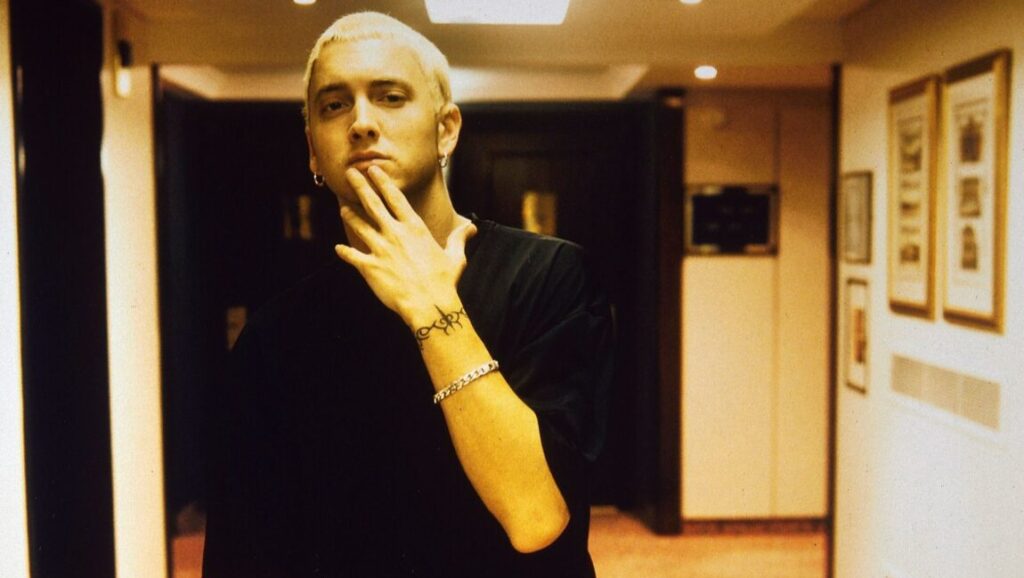In the winter of 1996, Marshall Mathers put everything on the line. Under the moniker of Eminem, he had been making waves in Detroit’s underground battle rap scene for about half a decade, supporting his family with various odd jobs with the hope his dedication would one day pay off. After signing to independent label Web Entertainment, he was about to finally get his shot with the release of a debut record that was destined to make or break the young MC. Titled Infinite, it featured relatively uninspired production, unmemorable bars delivered with a mimicked Nas-flow, and lazy attempts at crafting wannabe radio hits — it was a major flop, both critically and commercially. Instead of giving up, Mathers got mad, and in retaliation crafted the nastiest persona he could imagine: the sadistic, misogynistic, and overall villainous Slim Shady. Em’ dabbled with portraying this new alter ego slightly on his 1997 follow-up, The Slim Shady EP, which earned him the attention of former-NWA member and Death Row Records escapee Dr. Dre, who had just founded the already fledgling Aftermath Records. Dre took a chance on the impoverished white boy (who at the time still lived in a trailer park with his mom) and took Em’s newly created character to even greater malicious heights, on 1999’s The Slim Shady LP. Lead single “My Name Is” served as Eminem’s fresh introduction to the world, with his intentionally irritating vocal delivery and eye-catching lyrics (“Got pissed off and ripped Pamela Lee’s tits off / And smacked her so hard I knocked her clothes backwards like Kris Kross”) serving as his new default modus operandi. Even now, it’s a song that practically begs you to dislike it, seemingly repelling listeners with cartoonishly graphic images of Shady stapling his high-school teachers testicles together one minute and killing his absentee-father the next — yet, it’s through this perversion that Eminem’s found his real talent as an MC: taking Middle America’s most repressed feelings of indignation and blowing them up to darkly comic dimensions.
Registered with enough righteous anger to transform the no-name rapper into a commercial juggernaut, cementing his position in the hip-hop pantheon.
The Slim Shady LP operates more as a Shakespearean tragedy than as provocative edge-baiting, with each song finding new ways to creatively place Em’s monstrous invention in conversation with the world around him. There’s “Guilty Conscious,” where Slim Shady is pitted against his mentor, Dre, in a warring battle between moral rationality and cathartic release (spoiler: the bad guys win), and on tracks like “Brain Damage” and ‘Rock Bottom,” the violent alter-ego is revealed to be a byproduct of real-world injustices. Supporting players pop-up as counter-points to Slim’s villainy; the innocent bystanders who serve as victims to his evil ways that range from his (at the time) estranged wife Kim, who’s murdered and subsequently buried on the devilish nursery-rhyme “‘97 Bonnie and Clyde,” to the fictitious, ex-heroin addict Susan who O.D.’s on “My Fault.” Or these guests serve as encouragement to the abuse, like Royce da 5’9″, who instigates (“We can get in two cars and accelerate at each other/To see which one’ll swerve first”), much to Shady’s delight (“So please leave me with the keys to your Jeep Eagle”), on the Ennio Morricone-sampling “Bad Meets Evil.” Outlandish moments like these that make tracks like “Role Model” even more perversely humorous — an audaciously transgressive white devil scoffs at the ideas of children taking his raps literally, screaming “I got genital warts and it burns when I pee / Don’t you wanna grow up to be just like me?” Em’s voice practically drips with resentment over Dre’s carefully arranged guitar strings. The most sobering moment on the album, though, comes during the closer, as Em delivers an emotionally-drained, fourth wall-breaking rumination on his possible death (“Hell yeah, I’m afraid of death…I don’t want to die yet”) before finally declaring the closest thing he can call an ethos: “But if I offended you, good / ‘Cause I still don’t give a fuck.” For Marshall Mathers, the man who would eventually sell-out again to make radio-friendly hits, this remains probably the most electrifying statement of his career — one that registered with enough righteous anger to transform the no-name rapper into a commercial juggernaut, cementing his position in the hip-hop pantheon.
Part of Kicking the Canon – The Album Canon.


Comments are closed.